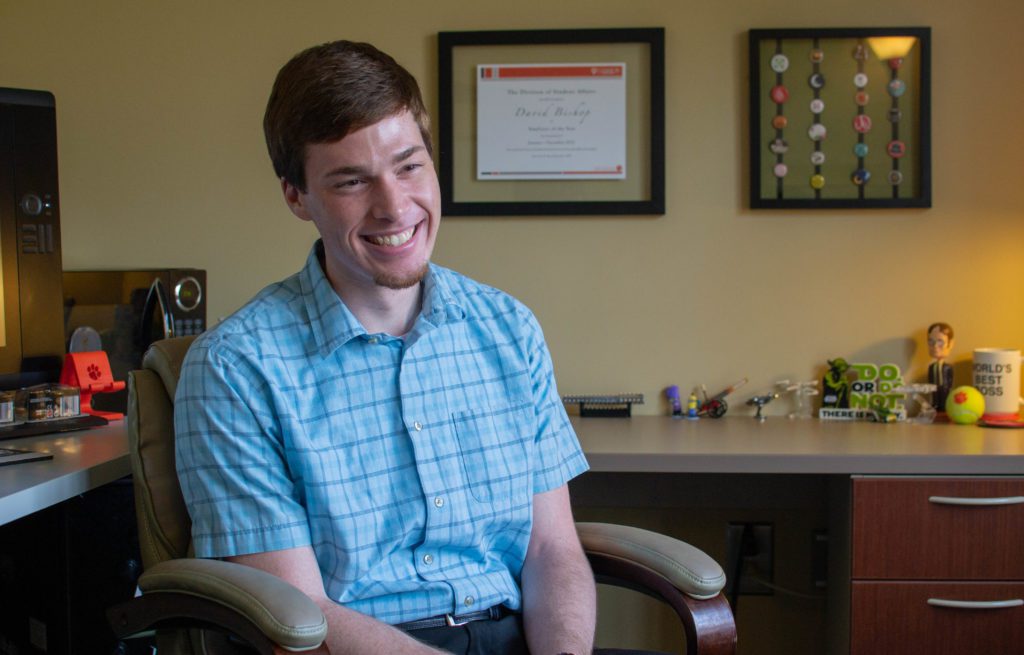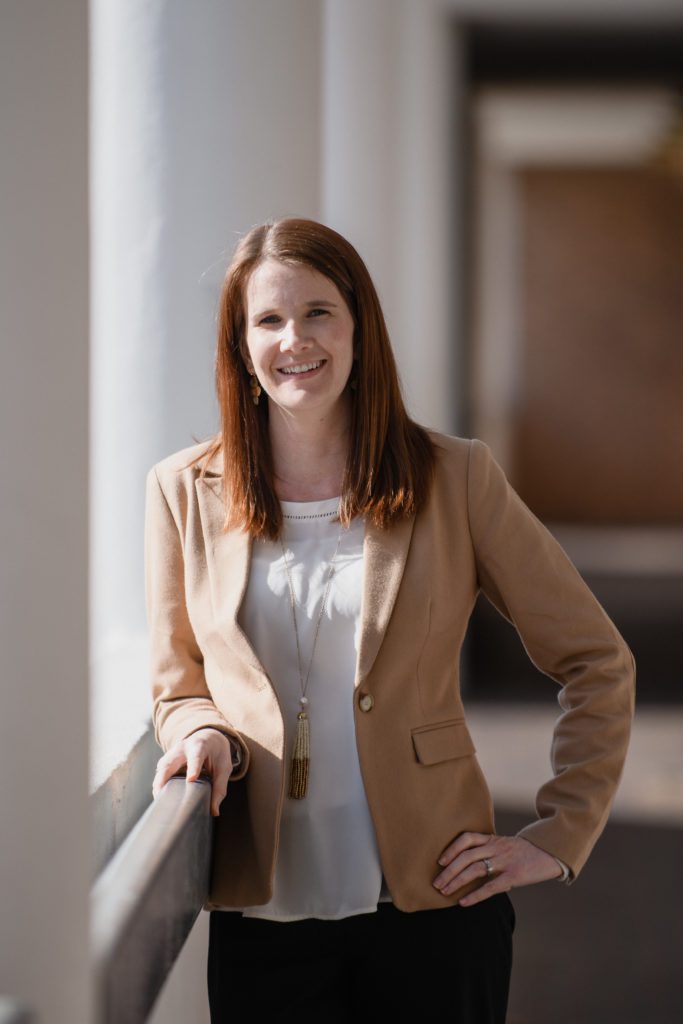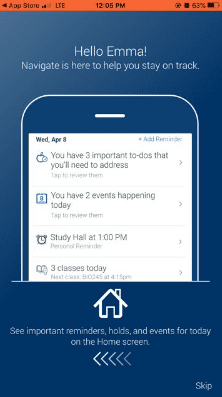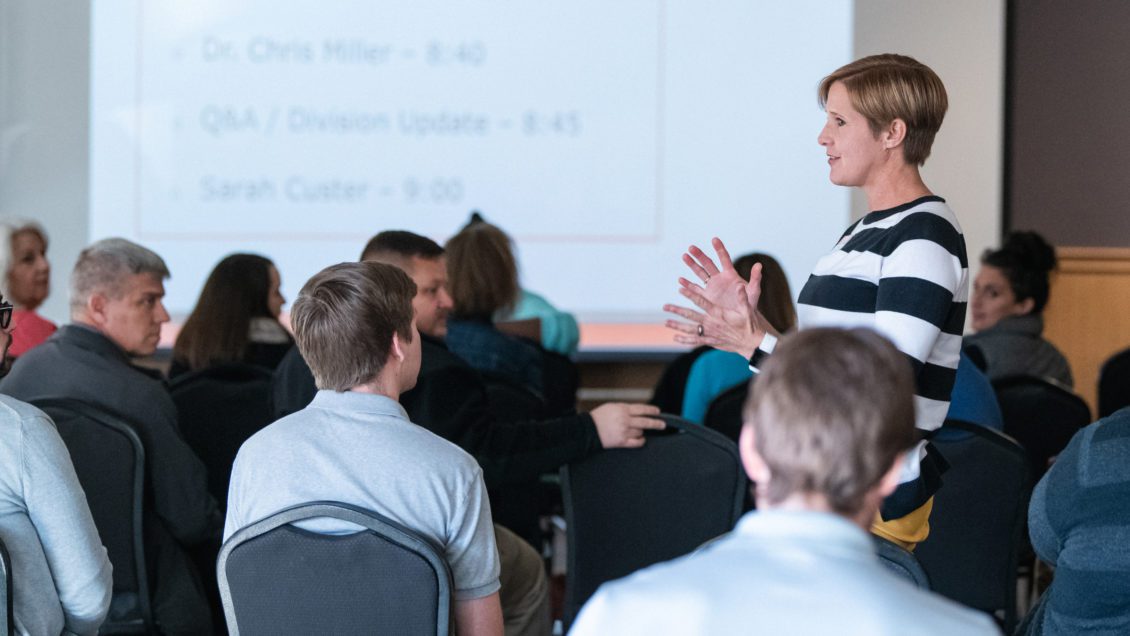Student learning is clearly a significant outcome of the wide range of programs and services available on the Clemson University campus. It’s also one of four core themes identified by the Division of Student Affairs as critical to the work done to support students beyond the classroom.
On Wednesday, approximately 40 staff members joined in on an informative Zoom discussion related to student learning as part of the Experience: IMPACT series facilitated by Student Affairs. This is the third year of the series, which began as a result of the division’s 2019 staff experience survey.
“Our online format supports colleagues joining us where they are and sharing of data right on the screen enables everyone in the audience to follow along clearly,” said Kristin Walker-Donnelly, who spearheads assessment practices for Student Affairs. “We like sharing the impact we have. We recognize supporting student success is the result of our performance drivers – people, execution and outcomes.”
—–
Abby Dill pulled off a rare repeat as a guest after presenting earlier this semester on the impact of Tiger STEPS and Tiger Accountability through the lens of health, safety and wellness. The two educational programs are part of the student conduct process overseen by the Office of Community and Ethical Standards (OCES).
This time around, Dill spoke for about 10 minutes on how the two programs are impacting student learning. Tiger STEPS is an approximate 3-4 hour program that includes a final reflection assignment with a focus on choice-making and values. Tiger Accountability is a policy review course and is much shorter, typically 45 minutes in length.
“We want to promote accountability and growth in students,” she said. “How do we know we’re meeting those goals? We look deeper into these programs and want to know what students think of our process – is it accessible, equitable and inclusive? Are they buying into it? How are we creating an assessment to know it’s effective?”
Dill said OCES has initiated several assessment instruments, such as a reflection rubric for Tiger STEPS that is tied to direct learning outcomes. Additionally, the office receives feedback on the program’s logistics. With Tiger Accountability, OCES measures indirect learning through a post-experience survey.
Through these measures, OCES has been able to overcome some of its biggest challenges, including the inefficient use of a single program to address lower-level conduct matters.
“We’ve provided a more structured platform for students to share input and more directly targeted our educational mission,” she said, adding the assessment practices have proven to be efficient and productive ways to support student learning.
—–
David Bishop of Student Affairs Publications and Pam Davis from Campus Reservations and Events took turns presenting on how their specific departments prepare students to transition to life after Clemson.
By utilizing the core competencies devised years ago by the Center for Career and Professional Development, both presenters shared real-time examples of how students learn and grow throughout their time working with these areas.
Bishop said while SA Pubs does not have much contact with students through events, the department instead chooses to leverage internships and has developed a working model for embracing a variety of students across multiple academic disciplines and experience levels.

“All of our staff members are involved in this process, as far as the internship experience goes for students,” said Bishop, who serves as assistant creative director for the department. “Most supervise students within their areas of expertise. We try and be very intentional with their work.”
Students intentionally develop goals and monitor their own progress through active journal reflections and ongoing assessment throughout the internship experience. In the most recent completed academic semester, students saw a 67% increase in their ratings on the three focus competencies they targeted during their internship.
Davis utilizes a much larger number of student employees in her area, which is responsible for facility reservations and more. Typically, they employ 50-60 students working across a wide range of areas, including reservation services, event services and operations/business services.
“Students start with us at an entry-level position and have opportunities to grow into student manager positions,” she said. “They serve on the front lines, which brings both challenges and opportunities. It provides hands-on learning opportunities to not only work through mistakes but also experience success. It’s a learning laboratory.”
Davis’ team holds monthly meetings with student workers and actively discusses personality/strength assessments, trainings, cross-trainings, and brings in guest speakers. As a result, students become more confident in a professional work environment, build valuable job skills and much more.
—–

Cara Snider and Kate Radford co-presented on a new initiative launched this past August, Clemson Leader Day. The idea really took off and became reality during the period of modified operations due to COVID-19.
“We want students to become leaders at Clemson,” Snider said. “We hope the implementation of this program for incoming students provided an opportunity to do just that.”
Clemson Leader Day took place on Sunday, Aug. 15. It was a half-day session facilitated by two Welcome Week student leaders who were assigned to each small group. The program included content such as pre-collegiate leadership experiences, community building, group dynamics and goal-setting.
The new program was built into Welcome Week and the New Student Orientation process. Once it concluded, the Center for Student Leadership and Engagement surveyed participants to solicit feedback. What they found was largely positive data, including the fact most respondents agreed or strongly agreed the University is committed to their growth as a leader.
“Leadership learning is fundamental to the advancement of our campus,” said Radford, who directs Clemson’s leadership education and development efforts.
—–
Rene’ Schmauder served as a guest presenter from the Office of Undergraduate Studies. She has a multi-faceted role on campus, which includes teaching in the psychology department, providing analytics to the dean and supporting assessment of undergraduate learning.

Schmauder presented on CU Navigate, a student-centered mobile app that provides students with support where they need it through customized and on-demand information. The idea was brought to life several years ago by John Griffin, who now serves as senior associate provost and dean of Undergraduate Studies. He desired an advanced student success management and reporting tool.
CU Navigate allows for centralized information, which is available to a wide variety of campus partners – including advisors, faculty and support staff. The app allows for the synchronization of calendars when appointments are made, advisors can go in and log meetings and faculty utilize it to report grades.
Typically downloaded at Orientation, student users can customize interests, easily view course schedules and set up meetings and reminders.
“It offers students a streamlined experience,” Schmauder said. “When a student changes majors, for example, their next advisor has access to information they worked on with previous advisors and can see information related to that student’s success. It is an excellent way for them to get connected with support services as needed.”

